Acne is a skin condition mainly occurring when hair follicles and pores get clogged with sebum (skin oil), dead skin cells, and other impurities. It can lead to breakouts, causing pimples and spots in the affected skin areas. While these pimples commonly occur on the face, they may also erupt in other areas, such as the neck, chest, and back.
Not only can acne cause pain and discomfort, but it can also affect your aesthetics with its unsightly lesions and pimples. Fortunately, this problem can be managed with medications, clinical treatments, and home remedies.
Table of Contents
What Causes Acne?
Acne is caused by a process happening in the following sequence:
- Excess sebum production by sebaceous glands, which are oil glands connected to hair follicles
- Clogging of those follicles with sebum and dead skin cells
- The proliferation of Cutibacterium acnes (formerly Propionibacterium acnes) bacteria in the clogged follicles
- Bacteria causing inflammation in the walls of clogged follicles
This process can lead to the formation of whiteheads, blackheads, pimples, and other forms of acne lesions.
Factors that may contribute to or worsen acne include the following:
- Hormonal changes: Fluctuations in hormones, particularly androgens, can lead to enlarged sebaceous glands and increased sebum production. This increases the risk of pores getting clogged and inflamed.
- Medications: Certain medications, especially those containing corticosteroids, lithium, and testosterone, can cause hormonal imbalances, leading to sebum overproduction.
- Diet: Some studies suggest a link between diets high in certain carbohydrates and the exacerbation of acne.
- Stress: Stress won’t cause acne, but it may worsen the condition.
What Are The Signs And Symptoms Of Acne?
Acne is generally identified by various skin changes, including:
- Cysts (large, painful lumps beneath the skin)
- Whiteheads (closed plugged pores)
- Blackheads (open plugged pores)
- Papules (small red, tender bumps)
- Pustules (pus-filled pimples)
When To See A Doctor?
- You may need to see your dermatologist or doctor if:
- You have noticed scarring due to acne breakouts.
- Your acne problem affects your self-esteem.
- You notice pigmented spots on the affected skin area.
- You experience pain and discomfort caused by acne breakouts.
- Your acne doesn’t respond to home remedies and topical OTC products.
How is Acne Diagnosed?
Your doctor will physically examine the acne breakouts to determine their type and severity. They will also take note of where these breakouts appear on the skin.
It’s important to differentiate acne from other conditions that may resemble it, such as hidradenitis suppurativa, perioral dermatitis, and certain types of rosacea, as these conditions require different treatment approaches. Those conditions may require significantly different treatments from acne management and prevention.
Therefore, seeing a board-certified dermatologist is vital for accurate diagnosis and proper treatment of your skin problem.
Acne Treatment Options
Medications
Dermatologists at Dubai Cosmetic Surgery recommend both OTC and prescription medications – topical, oral, or both – to manage acne. The main ingredients of these medications include:
- Benzoyl peroxide: This agent works by eliminating bacteria in the follicles, preventing inflammation.
- Salicylic acid: This acid helps unclog pores and follicles.
- Glycolic acid: This ingredient helps remove dead skin cells and oil from the follicles. Research suggests that glycolic acid may have properties beneficial for skin health, including potential antioxidant and antibacterial effects.
- Antibiotics: These are prescription drugs available as topical and oral medications. Topical antibiotics for acne often contain clindamycin or erythromycin, but their use should be limited to reduce the risk of antibiotic resistance. On the other hand, oral antibiotics may include minocycline, doxycycline, and tetracycline.
- Retinoids: For moderate to severe acne unresponsive to OTC medications, doctors may prescribe retinoids. These medications help prevent clogged pores. Depending on your condition, the dermatologist may prescribe retinoids in combination with benzoyl peroxide, oral antibiotics, or other medicines. And for severe acne that results in cystic lesions, you may be given isotretinoin.
Clinical Treatments
The most common clinical treatments for acne include the following:
Chemical peels: Light peels, which may include glycolic acid, salicylic acid, or other agents, are used clinically to help reduce mild acne symptoms and improve skin texture.
Laser treatment: Laser therapies can target various aspects of acne, including reducing sebum production and inflammation. They are often used as part of a comprehensive acne treatment plan.
How Can I Treat My Acne Naturally?
Several home remedies can help reduce pimples and spots caused by acne. The most effective ones include the following:
- Tea tree oil: Extracted from the leaves of the tree Melaleuca alternifolia, tea tree oil has shown potential in reducing skin inflammation, but more research is needed to confirm its effectiveness. This oil fights p.acnes and s.epidermidis, the two bacteria strains known to cause acne spots.
- Other essential oils: Some essential oils like cinnamon, clove, lavender, and rose oil may have antibacterial properties that could be beneficial against acne-causing bacteria. However, their effectiveness and safety for acne treatment require further research.
- Green tea application: Topical application of green tea extract may help reduce inflammation and sebum production in acne, although more research is needed for conclusive evidence.
- Moisturizing with Aloe vera: Aloe vera gel may help in reducing inflammation and promoting wound healing when applied to acne-affected skin. Its antibacterial properties might also be beneficial, but more research is needed to confirm these effects.
Is acne 100% curable?
While acne cannot be ‘cured’ in the traditional sense, its symptoms can be effectively managed with a combination of home remedies, medications, and clinical treatments.
Before & After
No Guarantee, as the results may vary from person to person.
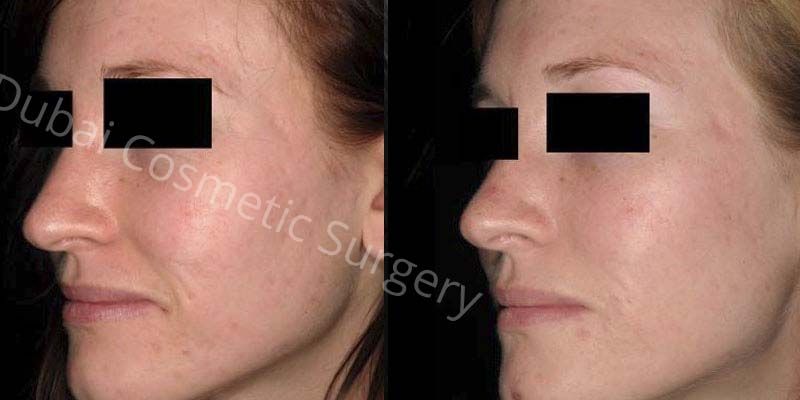
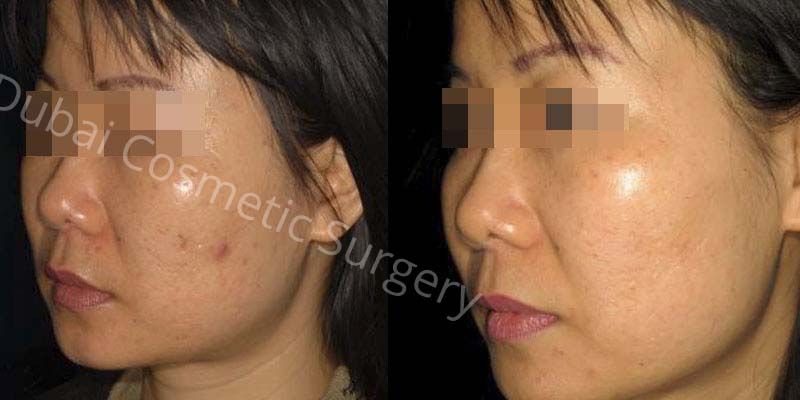
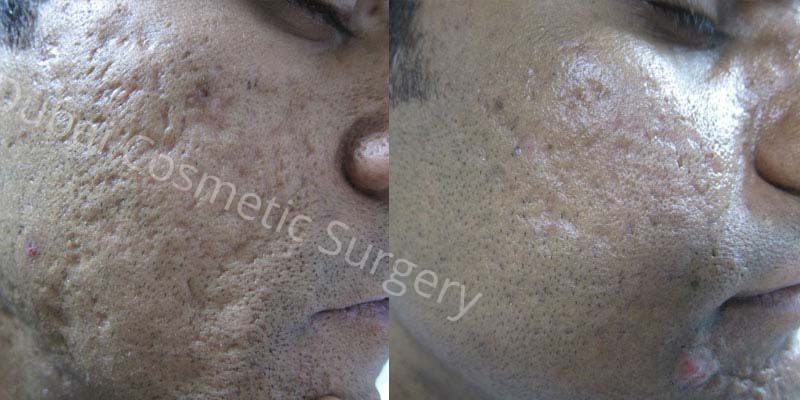
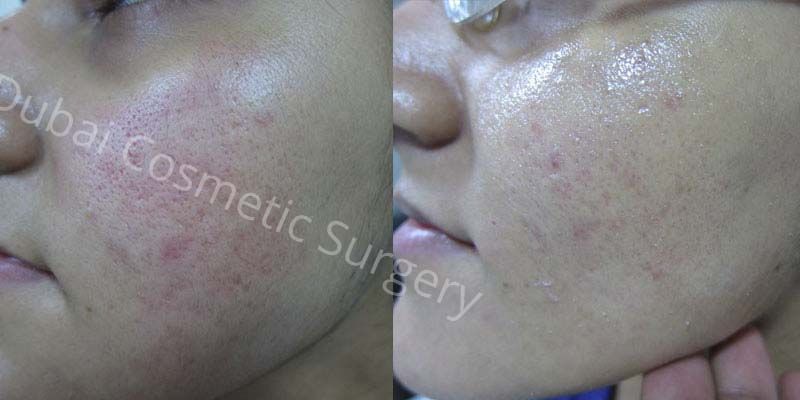
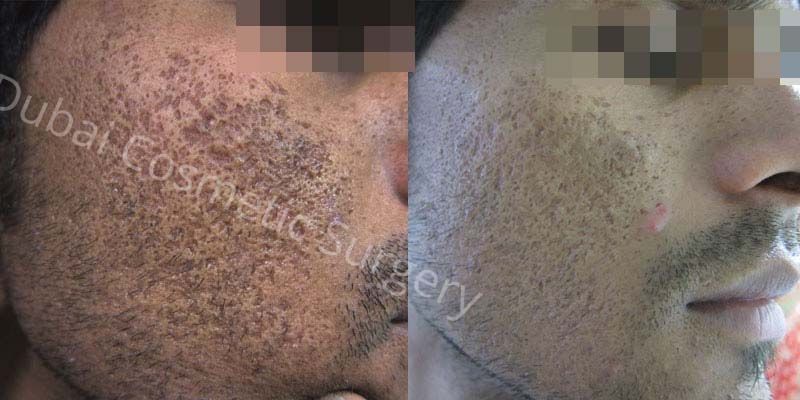
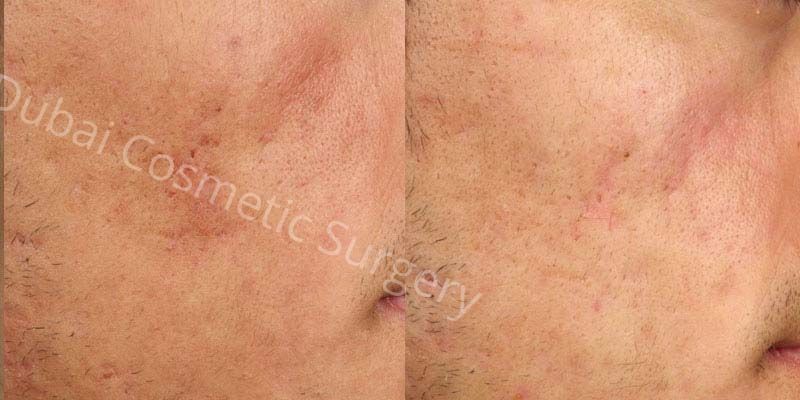
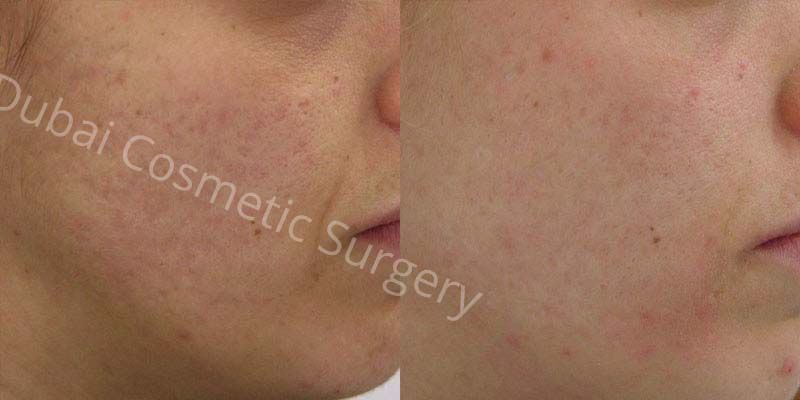
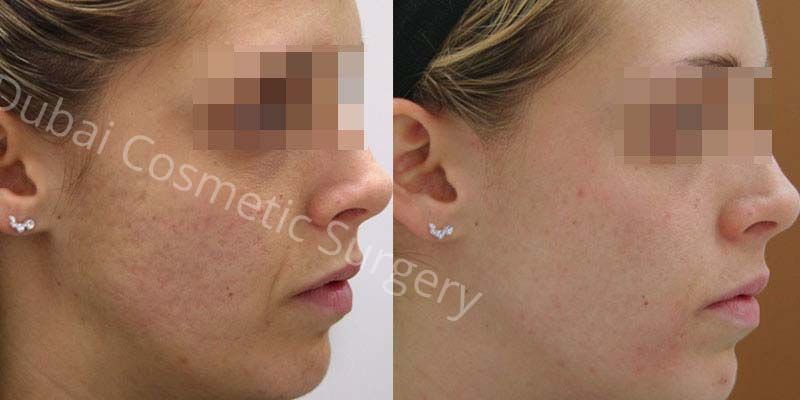
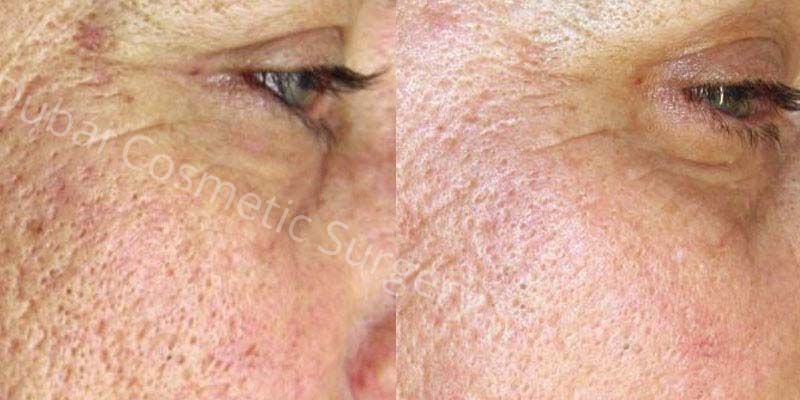


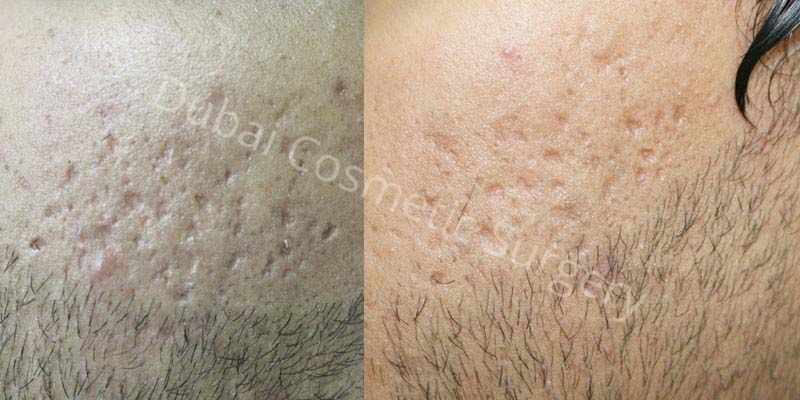
What Is The Cost Of Acne Treatment?
The average starting cost of acne treatment in Dubai is AED 1450. The exact cost of the treatment is subject to change from person to person, mainly depending on the following factors:
- Acne’s severity
- The type of treatment option chosen
- The practitioner’s expertise
- The geographic location and reputation of the treatment facility or clinic
Acne Treatment FAQs
How much does it cost for acne treatment?
The starting cost of Acne treatment at Dubai Cosmetic Surgery Clinic is 1450 AED. It may vary on different factors like the doctor’s expertise and experience, Treatment plan, technology, level of acne, and treatment session.
Are acne and pimples the same?
Acne is a broader term referring to a skin condition that can manifest as various types of lesions, including pimples. Pimples are a symptom of acne and can vary in severity.
Do cosmetic products aggravate acne?
Certain cosmetic products, especially those that are oil-based or contain alcohol, can exacerbate acne in some individuals. It's recommended to use non-comedogenic products.
Does acne go away naturally?
Acne may improve after puberty, but it can persist into adulthood. If acne worsens or doesn't improve, seeking medical treatment is advisable.
Our Doctors
Why Choose Us?
Dubai Cosmetic Surgery Clinic is a pioneer in providing cosmetic procedures in Dubai. Our dermatologists are certified by reputable boards with extensive experience in dermatology and aesthetic consultancy. Feel yourself in safe hands to get aesthetic treatments from highly expert doctors. You can book an appointment with our experts by filling out the form given below. To explore the location of Dubai Cosmetic Surgery Clinic, visit our address guide.
Fill in the form to get a consultation
100% Financing with 0% Interest

